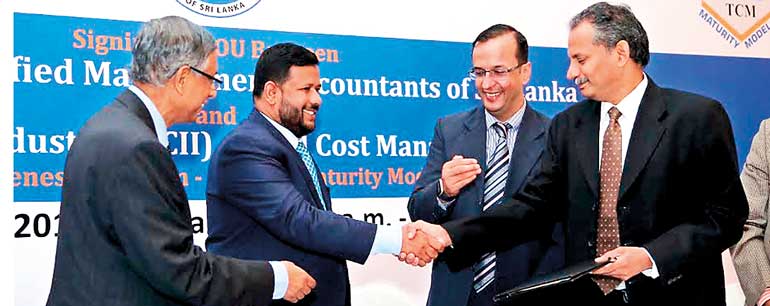Tuesday Feb 17, 2026
Tuesday Feb 17, 2026
Wednesday, 30 March 2016 00:00 - - {{hitsCtrl.values.hits}}
 Minister of Industry and Commerce Rishad Bathiudeen (second from left) greets Chennai based Head of CII-TCM Division K.V. Mahidhar (far right) as Mahidhar prepares to exchange signed MoU with of CMA Sri Lanka President Prof. Lakshman R. Watawala (far left) and as First Secretary, Economic and Commercial of High Commission of India to Sri Lanka Kartik Pande (second from right) looks on at 29 March session at Taj Samudra Hotel
Minister of Industry and Commerce Rishad Bathiudeen (second from left) greets Chennai based Head of CII-TCM Division K.V. Mahidhar (far right) as Mahidhar prepares to exchange signed MoU with of CMA Sri Lanka President Prof. Lakshman R. Watawala (far left) and as First Secretary, Economic and Commercial of High Commission of India to Sri Lanka Kartik Pande (second from right) looks on at 29 March session at Taj Samudra Hotel
As Lankan industries face increasing market challenges, accurate identification of their costs is essential for them to face both local and global competition. Therefore it is time that Lankan industries adopt stronger cost controls across the board, said a top Lankan Cabinet Minister.
“Rising costs have become a big challenge to our industry competitiveness. I believe that our industries need to adopt stronger cost controls,” said Lankan Industry and Commerce Minister Rishad Bathiudeen, while addressing a high level cost accountants’ conference in Colombo on 29 March, jointly held by Institute of Certified Management Accountants of Sri Lanka with Confederation of Indian Industry (CII)’s Total Cost Management (TCM) division.
The session saw the signing of an MOU between CMA Sri Lanka and CII’s Total Cost Management Division to introduce the world’s first ever ‘Total Cost Management Maturity Model’ practice to Sri Lanka. The new costing philosophy is developed based on the CMM-I system used in IT industry and is created after considerable study with experts of the domain. TCM has five stages of advancements called as ‘stages of maturity’ – Minimal, Functional, Operational, TCM Enabled and Exemplary. TCM adopters’ ultimate goal is the ‘Exemplary’ level.
Joining the session were Chennai based Head of CII-TCM Division K.V. Mahidhar, CMA Sri Lanka President Prof. Lakshman R. Watawala, First Secretary, Economic and Commercial of High Commission of India to Sri Lanka Kartik Pande and accounting professionals from Lankan corporate and public sectors.
“Profitability of the companies depends not only on their revenues but also on the effectiveness of their cost management. Revenues are market driven and may not be very clear until sales are confirmed. On the other hand, except for variable costs, most costs in general are far more predictable and could be identified to formulate a working model of total cost estimation. Still, as information complexities grow in a climate of market uncertainty, using common cost management as a tool to gain competitive advantage becomes more and more challenging,” said Minister Bathiudeen.
“Today, a large section of the local industries catering to the local and export markets are facing many challenges in costing and pricing of products and meeting the competition as a result. The apparel industry which is the largest industrial export from Sri Lanka has faced competition from low cost supplier countries and some global buyers have switched to these low cost suppliers. TCM could help to control overall costs thereby streamlining total costs and overcoming costing challenges. Another example is that the challenges to our own industry sector competitiveness.
“In fact, rising costs have become a big challenge to our industry competitiveness and Sri Lanka’s fluctuating Global Competitiveness Report score clearly indicates the impact of this issue. Therefore I believe that our industries need to adopt stronger cost controls across the board. It is here that CMA’s total cost management practice introduced today can become a strong enabler for us. I commend CMA for introducing a practical solution today in this regard,” he added.
“We are pleased to introduce ‘Total Cost Management Maturity Model’ (TCMMM) practice to Sri Lanka for the first time. In fact TCMMM is also world’s first ever such model on costing,” said Chennai based Head of CII-TCM Division K.V. Mahidha and added: “TCM is costing by design. It is one of the most powerful tools that firms can wield in their quest for competitive advantage.”
In the 2014-2015 Global Competitiveness Report, Sri Lanka slipped by eight places but in 2015-2016 report Sri Lanka moved up by five positions to 68 (from 140 countries assessed).